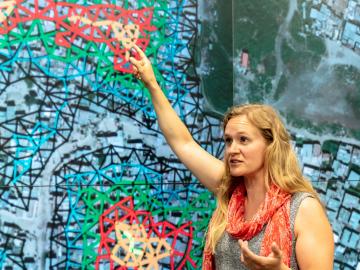
Filter News
Area of Research
- (-) National Security (19)
- (-) Supercomputing (32)
- Advanced Manufacturing (2)
- Biology and Environment (14)
- Computational Biology (1)
- Computer Science (3)
- Electricity and Smart Grid (3)
- Energy Science (49)
- Functional Materials for Energy (1)
- Fusion and Fission (21)
- Fusion Energy (12)
- Materials (21)
- Materials for Computing (5)
- Neutron Science (10)
- Nuclear Science and Technology (14)
- Quantum information Science (8)
- Sensors and Controls (1)
News Type
News Topics
- (-) Coronavirus (12)
- (-) Cybersecurity (13)
- (-) Fusion (2)
- (-) Grid (7)
- (-) Molten Salt (1)
- (-) Partnerships (2)
- (-) Quantum Science (16)
- 3-D Printing/Advanced Manufacturing (5)
- Advanced Reactors (2)
- Artificial Intelligence (30)
- Big Data (24)
- Bioenergy (6)
- Biology (11)
- Biomedical (12)
- Biotechnology (2)
- Buildings (3)
- Chemical Sciences (3)
- Computer Science (74)
- Critical Materials (3)
- Energy Storage (6)
- Environment (22)
- Exascale Computing (19)
- Frontier (21)
- High-Performance Computing (36)
- Isotopes (2)
- Machine Learning (17)
- Materials (11)
- Materials Science (13)
- Mathematics (2)
- Microscopy (3)
- Nanotechnology (8)
- National Security (28)
- Neutron Science (9)
- Nuclear Energy (6)
- Physics (6)
- Polymers (2)
- Quantum Computing (16)
- Security (10)
- Simulation (15)
- Software (1)
- Space Exploration (3)
- Summit (29)
- Transportation (6)
Media Contacts

In human security research, Thomaz Carvalhaes says, there are typically two perspectives: technocentric and human centric. Rather than pick just one for his work, Carvalhaes uses data from both perspectives to understand how technology impacts the lives of people.

A new paper published in Nature Communications adds further evidence to the bradykinin storm theory of COVID-19’s viral pathogenesis — a theory that was posited two years ago by a team of researchers at the Department of Energy’s Oak Ridge National Laboratory.

Five National Quantum Information Science Research Centers are leveraging the behavior of nature at the smallest scales to develop technologies for science’s most complex problems.

Researchers at the Department of Energy’s Oak Ridge National Laboratory and their technologies have received seven 2022 R&D 100 Awards, plus special recognition for a battery-related green technology product.

Travis Humble has been named director of the Quantum Science Center headquartered at ORNL. The QSC is a multi-institutional partnership that spans industry, academia and government institutions and is tasked with uncovering the full potential of quantum materials, sensors and algorithms.

When the COVID-19 pandemic stunned the world in 2020, researchers at ORNL wondered how they could extend their support and help

Though Nell Barber wasn’t sure what her future held after graduating with a bachelor’s degree in psychology, she now uses her interest in human behavior to design systems that leverage machine learning algorithms to identify faces in a crowd.

How an Alvin M. Weinberg Fellow is increasing security for critical infrastructure components

Unequal access to modern infrastructure is a feature of growing cities, according to a study published this week in the Proceedings of the National Academy of Sciences

Three ORNL scientists have been elected fellows of the American Association for the Advancement of Science, or AAAS, the world’s largest general scientific society and publisher of the Science family of journals.


